Book Your Free Demo Now
About Us
Get the Course You Want
We offer the best Java Full Stack Development Training in Kalyan Nagar. This course contains the most current java technologies to become proficient in java Full-stack development. We have taught over all concepts of core java in-depth knowledge with 100% practical training. You will be getting trained on HTML, CSS, javascript, Core Java, hibernate, spring, and MongoDB.
Our course program is intended by Industry experts. We recommended to work on real-time projects. It will assist out you to turned out to be into a professional in java full stack development, 24/7 trainer support.
We can offer 100% job assistance to our students in top MNCs like Wipro, Accenture, TCS, and more and more.
What will you learn in this course ?
In this Java Full-Stack course, you will be getting trained on
- To give details about the basics of full-stack cover important concepts like variables, data types, conditions, strings, arrays, iterations, methods, Java FX, Spring Boot,so and so on.
- To be getting trained on the core topics of Frontend/backend development.
- To get recognizable with the latest web development technologies.
Why Trishana
Flexibility at every level
Handpicked industry expert trainers
A team of experts to fulfill your training
Best curriculum to help you gain the edge
A customer centric approach
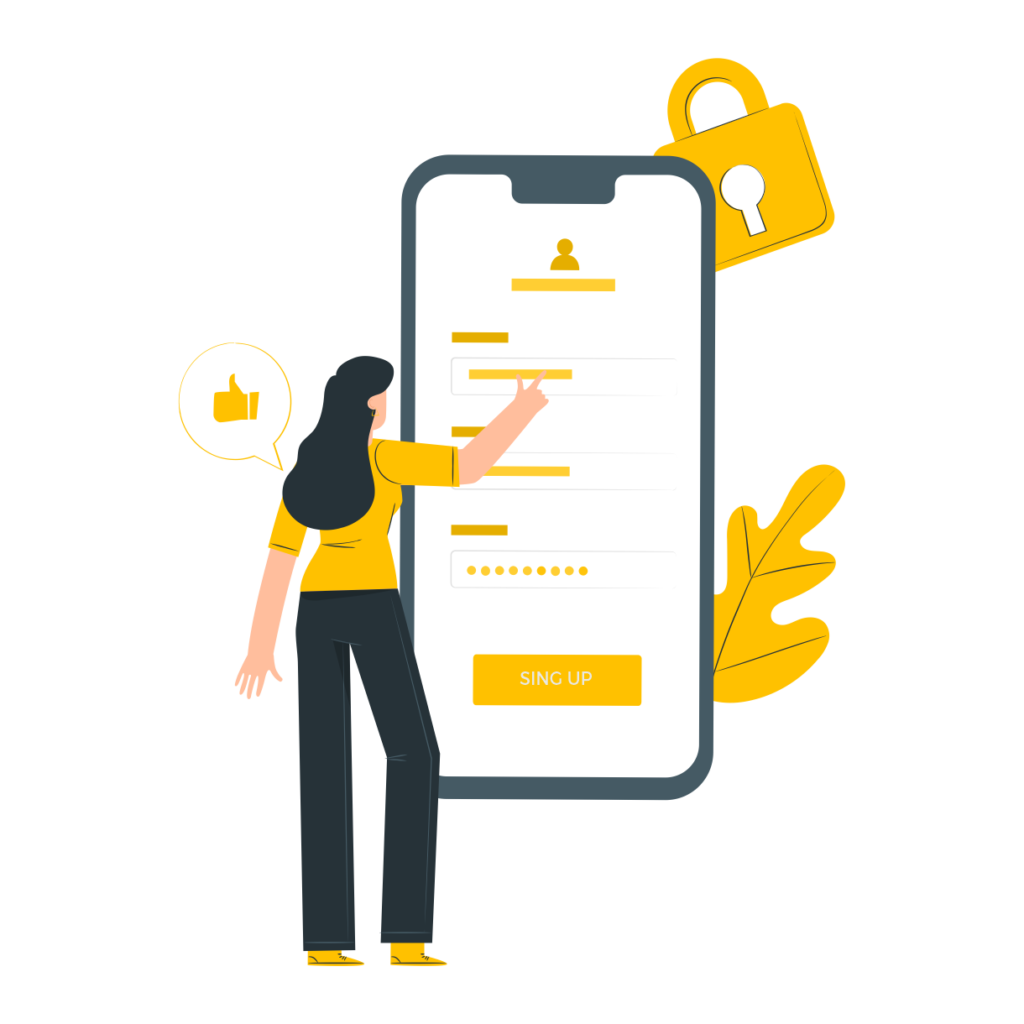
Book Your Free Demo Now
Java full stack training in Kalyan Nagar
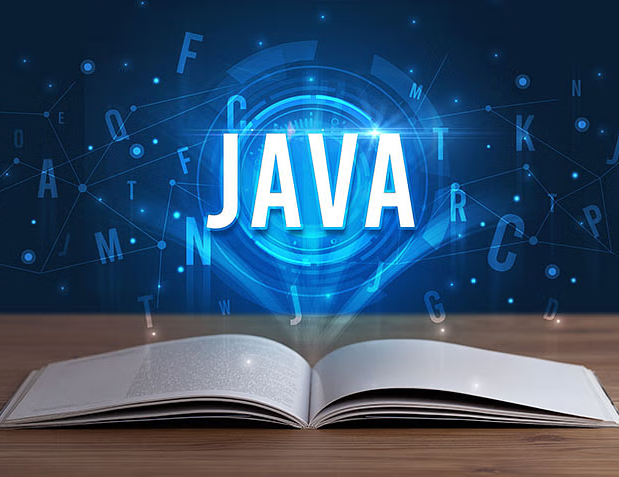
Real-Time Experts as Trainers
- Real-Time experts as Trainers
- Live industrial Projects
- Certification courses
- Affordable Fees structure
- Flexibility in timings wise
- 100 % Placement Support Assistance
What is Java?
Java is a object-oriented, class-based, concurrent, safe, and general-purpose computer programming language. It is a typically used strong technology. This JAVA Certification Course is helpful for the skill development and improving knowledge & core java course offered to turned out into be a successful java full stack developer.
What are the main objectives of our JAVA Certification Training?
The main reason of this java training is to build you a professional java full-stack developer and you will be capable to write code for make a software application, and to make android app development. This java course covers important concepts of java programming like variables, data types, conditions, arrays, strings, methods, JavaFX, and so. How to make up interactive software with the help of JAVA. Trishana Technologies assists you to build up the techniques and programming skills and concepts in-depth knowledge.
Requirements to learn this
- For basics of Java programming knowledge(Optional)
- A computer/Laptop
- JDK (Java development kit)
- IDE (Eclipse, VS Code, IntelliJ IDEA)
- Interest to learn on new things
Who should go for this training?
Trishana technologies training on Java Full Stack Development gives you the basic knowledge of Artificial Intelligence:-
- Technical and Non-technical participants can do
- Students who want to be getting trained on Java Programming.
- Professionals in the field of software, who desire to make a job switch to Java Full-stack Development.
- Frontend / Backend Developer domain
What are the prerequisites for a Java Course?
Few basics for pursue the Java full-stack course are:-
- Freshers Students/working professionals should have the interest to learn the new technologies.
- Basics of programming languages such as C/C++.
- You must recognize at least the basics of how to use a computer
- Curious mind
Key Learning Objectives
Java Fundamentals
Master core Java concepts, as well as multi-threading, Lambdas, Collections framework, and file handling.
Hibernate
Explore Hibernate, be trained to build applications using JSP and Hibernate, and perform CRUD operations.
Spring Framework
To dive into the Spring framework, by covering Inversion of Control, Dependency Injection, much and more.
JavaScript Basics
To understand important JavaScript concepts, as well as objects, loops, decision-making, array methods, and asynchronous JavaScript.
Spring Boot
To gain in-depth knowledge of Spring Boot, for covering migrations, security integration, Thyme leaf tags, and Restful API implementation.
What you’ll learn deeply in this course?
- To enhance your initial understanding of Java to seamlessly transition into advanced frameworks like Spring, Java EE, andJavaScript.
- To develop expertise in the latest Java version, Java 17, while also mastering previous iterationsincluding Java 8.
- To elevate your programming skills with complete Java fundamentals for a holistic grasp of key concepts important for advanced development.
- To make a fully execution web application through a basic step from a professional trainer.
- Java programming language
- To learn about Java server pages(JSP), Servlets, and JSTLfrom the basics to advance level of course.
- To understand about building web forms with JSP
- To apply validations on the forms
- For the usage of the web template to make the web application incredible
- To learn how to Handle Sessionsin JSP
- To develop Dynamic Web Applications
- To learn MVCin JSP
- For forms under JSP andServlets
- Collection
- To learn the concept related to Generics
- To add the validations on form data
- For adding the records to the database
- For updating record(s) into a database
- For Deleting record(s) into a database
- Spring Framework
- Web Services – RestFul API
- Spring Boot
Uncover the most top skills to be taught in our course
Java Programming
Spring Framework
Back-End Development
Server-Side Architecture
Spring Boot Restful API
JavaScript
Course Overview
- To explore the workings of decision-makingin Java.
- To Master the object-oriented programming concepts for skilled code organization.
- To dive into the powerful Collections framework and debugging techniques.
- To harness the flexibility of Genericsfor improved code reusability.
- To conquer the complexities of multi-threading conceptsand to understand Lambdas for concise, functional programming.
- To gain proficiency infile handling to control data seamlessly.
- To Learn how to make interactive web formsusing JSP.
- To execute form validations for a seamless user experience.
- To develop and deploy Java Servletsfor active web applications.
- To understand session management in JSP for improved user interactions.
- To explore database integration: add, update, and delete records easily.
- To master the art of image and file uploads for adaptable web applications.
- To establish a robust connection between Hibernate and databases.
- To delve into Hibernate Query Language (HQL) basics.
- To perform CRUD operationseffortlessly with Hibernate.
- To grasp the model of Inversion of Control (IoC) for flexible application architecture.
- To dive into Spring Beansfor modular and scalable development.
- To utilize the resource-based URIsfor CRUD methods and to handle JSON responses.
- To Implement HATEOAS principlesfor source discoverability.
- To ensure the usage of HTTP methodsfor robust APIs.
- For navigating the seamless transition from Spring Boot 2.7to Spring Boot 3
- To improve your applications by integrating Spring Security, Thymeleaf tags, and Restful APIsinto Spring Boot projects.
- To execute validations in the Register Formand to introduce a sleek Profile page on the Blog application.
- Incorporate user account supportto raise your Spring applications.
- To implement JWT token generationfor safe validation.
- To integrate the H2 database
- To explore web template integrationfor refined user interfaces.
- To strengthen application security with Spring Securityand Bcrypt password hashing.
- To develop some functionalities like profile updatesand password reset emails.
- To master keywordsand data types in JavaScript.
- To separate between normal functions and expression functions.
- To harness the power of for Each methodfor proficient array processing.
- To gain proficiency in DOM manipulationand to recognize callback functions.
- To gain a solid accepting of the fundamentals of the JUnit testing framework.
- To be trained on how to structure and implement effective JUnit test methodsfor strong and reliable testing.
- To survey the techniques for testing exceptions, ensure your code handles unexpected scenarios effortlessly.
- To dive into the legacy contented of micro-web services, exploring for bothbasic and advanced concepts.
- To master the details of JavaServer Pages Standard Tag Library(JSTL) for proficient web development.
- To explore Docker and WSLon Windows for containerized development.
- To implement OAuth2 with JWT token generationfor safe authentication.
- To develop Album APIwith Spring Boot.
Here are some of the important skills that a Java full-stack developer wants to have
- Core Java: To understanding of the Java programming language, its syntax, and its basic constructs.
- Web development:For the knowledge of HTML, CSS, and JavaScript.
- Back-end development:For the knowledge of Java servlets, JSPs, and Spring Boot.
- Relational databases: For the information about MySQL and PostgreSQL.
- Version control:To understanding about the Git and GitHub.
- Agile development methodologies: understanding of Scrum and Kanban.
- Unit testing:For the information regarding JUnit and Mockito.
- Problem-solving skills: For thecapability to recognize and solve problems.
- Communication skills: For the Ability to communicate efficiently with both technical and non-technical audiences
What is Java Full Stack Development?
Java full-stack development is a software development advance where a single developer can bear all aspects of the development lifecycle, from the front end to the back end. This includes designing, developing, and maintaining the application’s user interface (UI), as fine as its original code and data structures.
Java is a trending programming language for full-stack development because it is more flexible and can be used for regularly front-end and back-end development. Java also has a vast and lively community of developers, which means many sources are easily accessible to assist you to find out and use the language.
Full Stack Java Developer Roadmap Foundational
Java programming
To be getting trained on the basics of the Java programming language, include syntax, variables, data types, operators, control flow, and functions.
Object-oriented programming
To study about the principles of object-oriented programming, such as classes, objects, inheritance, polymorphism, and encapsulation.
Data structures and algorithms
To learn about data structures and algorithms, which are important for efficient programming.
Databases
To learn more about databases, which are useful to store and regain data.
Web development
To learn more about the fundamentals of web development, including HTML, CSS, and JavaScript.
What we expect from Trishana Technologies Java Full Stack Course
Trishana Technologies offers a comprehensive Java Full Stack course, to make sure a reliable future for aspirant developers.To gain proficiency in front-end technologies like HTML, CSS, and JavaScript frameworks, while mastering in Java, Spring, and Hibernate for strong back-end development. To dive into databases with MySQL and MongoDB, and to study version control with Git. To embrace a promising future in tech with Trishana Technologies.
To become a certified Java Full Stack proficient and to unlock your career potential. To learn front-end development with HTML, CSS, and JavaScript frameworks, and to excel in Java, Spring, and Hibernate for robust back-end solutions. To gain proficiency in databases like MySQL and MongoDB, and to master the version control using Git. To launch your career with a Java Full Stack course certification.
Enroll in the Java Full Stack certification course and to expand a viable edge in the tech industry. To learn front-end skills with HTML, CSS, and JavaScript frameworks, and to master in Java, Spring, and Hibernate for active back-end development. To acquire the database expertise with MySQL and MongoDB, and to understand the version control using Git. To unlock new career opportunities with the advantage of a Java Full Stack certification.
With a Java Full Stack certification, you can open new doors for excite job opportunities in the tech world. To become a Full Stack Developer, u should be responsible for both front-end and back-end development. For follow roles like Java Developer, Web Developer, or Software Engineer. Other more options included Database Administrator, DevOps Engineer, or Application Developer. Your skills will be extremely sought after across various industries, offering a talented career path.
Why Java full stack is so popular?
Java Full Stack development is amongst the most active skills in the Software IT Industry these days. As a fresher, it would be an tremendously good career option because it would enlarge your knowledge of the subject while also support you with placements. So you’ve preferred the perfect field to advance your profession in full stack development. What Is the importance of Having a Full-Stack Developer on Your Team? This not only saves a lot of money, but it also allow one person to handle and recognize all aspects of a project, to avoiding miscommunication and knowledge silos. A full-stack developer can switch a smaller-scale project on their own for them. It will take time to turned out to be a full stack developer. It is not only essential to learn various front-end and back-end technologies. It’s also about gaining a better awareness of those two areas and making contact between them as simple and as easy as possible. And you’ll need a lot of patience to get there.
To Whom this course is for:
- Java programmers those who are seeking to develop their skill set by delivering into web application development.
- Aspiring developers aim to concentrate in web application creation.
- Professionals keen on growing their proficiency in Java development.
- Future developers of web applications.
- Individuals with a goal to capably build swift web applications using Java.
Advantages
- Java is the most demanding programming language in the industry so being an expert in java and opens the gate for many good opportunities if that is what you are looking for.
- Java can be used to build any kind of software. The software can be an Enterprise Application, a website, a desktop application, a Search Engine or a Gadget. It can again be completed with ant programming language, which is pretty much true.
- Java is a safe and secure platform as it uses virtual machine. This is the main cause that companies worldwide consider in Java language.
- If you are well-known with java then learning of Android is much more easier for you.
- Full Stack Java as well as embedded systems also important with this courses.
Technologies that a Java Full Stack Web Developer must Know
For developers needs to master the subsequent technologies:
- By knowledge of backend languages such as Java, C#, or Scala is more preferable.
- To understand JavaScript's peculiarities (hoisting, equality, this, variable scope, etc.), include recent versions (ES6+).
- To significant about Angular, React, and Vue, the best JavaScript frameworks, as well as to build toolchain (preferably Webpack).
- They should have a basic knowledge of CSS (include margins and padding, displaying properties, and selectors), as well as CSS preprocessors.
- To experience with RDBMS (PostgreSQL, MS SQL, Oracle) and SQL standards (joins, subqueries, aggregate functions, normalization). You won't have to be concerned about MySQL's limitations or syntax differing from the standard as long as you recognize its limitations.
- To know the essentials of web development (authentication mechanisms, JSON, REST, HTTP, and password storage).
- An understanding of Unix is certainly advantageous.
What is Frontend Web Development?
Front end web development is the method of developing the client side of the web application in which the focus is on the users mainly. The full stack developer with users in mind undertakes this method to raise a website that is easy to use and relay with. The developer in this method focused on the visual elements of the application. It is also the task of the developer in front end development to make certain that the website or application run in a very soft fashion. Front end development focused on elements like:
- Images
- To Build the code
- For Database management system
- For application programming interfaces
- For Debugging or as troubleshooting the website or application
What is Backend Web Development?
Back end web development refers to the method of developing the server side of the website, i.e., the side that users cannot see or relay with. The main aim of back end development is to build the website interactive and easy to use with. During the back end development process, developers lay importance on:
- Architecture
- To Build the code
- For Database management system
- For application programming interfaces
- For Debugging or as troubleshooting the website or application
Therefore, front end and back end development are taking apart from each other in terms of the sides of the website application they alerted on. However, they two work collectively to make a dynamic and attractive website that offer users with an immersive knowledge when browsing
What is a Full Stack Developer?
Full-stack technology refers to the entire process of a computer system application, and full stack web developers are those who are proficient of developing both the front end and the back end of web development. All of them features that are recognizable to the client, or the viewer of the site, are integrated in the front end.
- For programming a browser (By using JavaScript, jQuery, Angular, or Vue)
- For programming a server (By using PHP, ASP, Python, or Node)
Let’s say you’re using your Instagram application. each time you refresh, new content is being loaded on your screen. You can be related to a picture, add new ones, look for such profiles and do so much more and more. Although, it provide a seamless user experience, there’s a group that will go on in the backend. HTTP requests are through the Instagram servers to recover and load information. This is easiness with the help of backend frameworks.
Typically, every application consists like the front-end, the backend, and the database.
A Full Stack Developer is associated with the creation of an application from its start to end. He designed the front end and the back end of an application while make sure its effectiveness, reliability, and other vital features.
Front End Developer
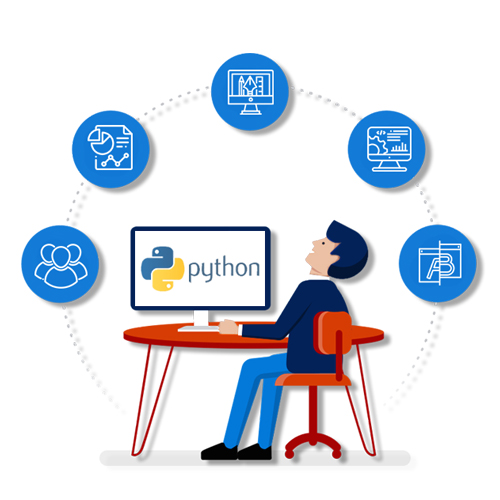
Back End Developer
Back end developers make use of technologies like Java, Python, .Net to make up the core application and usage of the website or web application. These professionals have the abilities that are essentially required to work on aspects like security, performance, scalability and response of the website.
What are the top 3 essential skills required for a Java full stack developer?
About more than 1000 top companies has recognized Trishana Technologies certifications globally.
Download the certificate once you,
- Complete our Java training program
- After successfully Completing the Realtime Industry projects
- Successful completion of given assignments
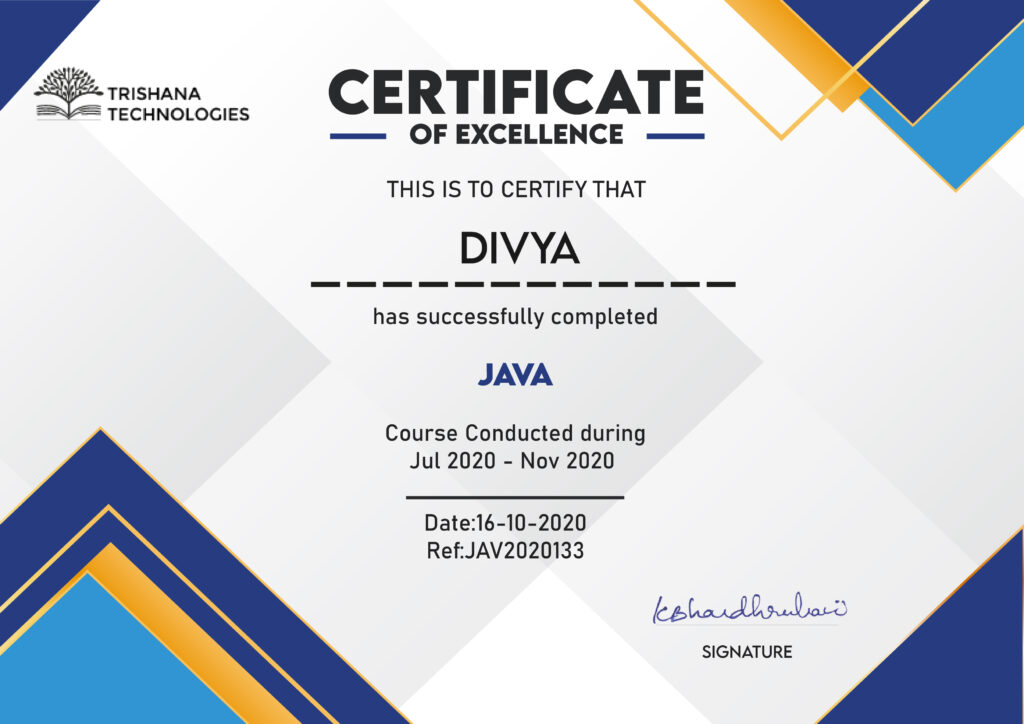
Java Full Stack training in Kalyan Nagar
Yes we do Java Full stack training in Kalyan Nagar training with other demanding courses such as, DevOps, Aws Cloud services, Selenium, Linux, Java, Big data, Data Science And so on, all are our trainers are having related experience in such field, all the curriculum having a recorded session with individual score and much more, per batch 4 – 5 peoples will be there so that the trainer can look for all the students as well
Upcoming Batches- AWS Course Training
| Feb 15 | Mon-Fri (45 Days) | FILLING FAST 7AM -11AM, 4PM – 9.30PM. |
| Feb 26 | Mon-Fri (44 Days) | FILLING FAST 7am to 11am & 5pm to 9.30pm |
| Mar 11 | Mon-Fri (45 Days) | FILLING FAST 7AM -11AM, 4PM – 9.30PM. |
| March 26 | Mon-Fri (44 Days) | FILLING FAST 7am to 11am & 5pm to 9.30pm |
What are the roles and responsibilities of Java full stack developer?
A Javafull stack developer is reliable for developing both the front-end and back-end components of a web application. Some of the input roles and responsibilities of a Python full stack developer include:
- Designing and implementing user interfaces: For creating the visually appealing and user-friendly interfaces that meet up the requirements of end-users.
- Back-end development: For rising and to maintain the server-side components of a web application, as well as databases and APIs.
- Database management: For design and implementing databases to store application data, and to ensure data is properly stored, organized, and retrieve.
- Debugging and problem-solving: Debugging and troubleshooting issues with the application, and resulting solutions to problems as they can be occurred
- Deployment: Deploying the application to production servers and make sure it is available and accessible to end-users.
- Collaboration: For working with other members of the development team, such as designers and product managers, to make confident that the application meet the necessities of end-users.
- Continual learning: Staying up-to-date with the most recent development trends and technologies, and regularly improving their skills and knowledge.
In addition to these core tasks, a Java full stack developer may also be concerning in the growth of other components of a web application, such as security and performance optimization. The exact roles and tasks of a java full stack developer can vary depending on the particular necessities of a project and the necessities of the organization.
Skills you need to become a full-stack Java developer
Here is a some listing of skills that you can obtain that may help you be more successful in full-stack Java development positions:
Front-end design ability
Full-stack Java developers regularly have an in-depth understanding of how to design front-end frameworks. This ability involves combining creative design elements with practical coding techniques to show definite aesthetics to users when they relate with your web applications. For display your knowledge of front-end frameworks on your resume may help distinguish you from other candidates during the application process. Full-stack developers regularly use the front-end frameworks React and Angular.
Testing ability
Java developers regularly create unit and integration tests during full-stack programming projects. In a unit test, developers estimate small units of code to decide their usability within the entire program. In an integration test, developers merge units of code to recognize how they function together. Employers may search for candidates who have a proven ability to make effective unit tests for the applications they generate. Understanding of specific unit testing frameworks such as Junit or Mokito can also help you to excel in tasks linked to test creation.
Ability to integrate microservices
Many Java-based web applications uses service-oriented architecture which enable developers to join together microservices. Microservices are the efficient components of a service-oriented program. Employers may search for candidates who understand microservices and know how to execute them within applications. Learning the Spring Framework can help you in displaying your ability to use microservices, as its functionality openly relates to microservice development.
Ability to use tools
Tools are an important component of full-stack development, as they assist developers collaborate, test and debug their codes. These tools might help developers to increase their effectiveness and work with a range of web technologies. DevOps tools like Docker, Ansible and AWS assist developers to create applications rapidly by helping them plan, test and to monitor their code. Integrated development environments (IDEs) such as Eclipse, NetBeans and IntelliJ IDEA can also assist developers to combine the three layers of the stack into one environment.
Ability to use APIs and libraries
Application programming interfaces (APIs) assist the developers to incorporate pre existing pieces of code into applications. These preexisting pieces of code come from libraries that other developers generate on the internet. Full-stack Java developers often have wide knowledge of libraries and know how to create APIs within the code they write down.
Ability to work well in teams
Aside from technical abilities, many full-stack Java development positions required you to work in highly concerted teams to complete large-scale projects. The ability to lead groups, to follow directions and identify team members' dedicated abilities may help you to achieve the production opportunities and to create better web applications. You can exhibit this skill on your resume and in interviews through descriptions of your prior work experience.
Why Choose This Course?
Comprehensive Content: Covering vital concepts, tools, functions, and topics necessary for Java Developers in the web based application development process.
Unique Teaching Style: To Experience a unique and easy-to-understand teaching methods that cater to various learning styles.
Hands-On Approach: To be trained by doing with a hands-on approach that lets you perform and strengthen your learning.
Career Enhancement: To improve your profession prospects as an IT professional by acquire in-demand skills.

Why Learn Full Stack Java Development?
In today’s digital era, where web applications drive businesses, full-stack Java Developers are in more demand. For Mastering the Full Stack Java Development that empowers you to generate dynamic and static web content, that offers a skill set that is vital in the ever-evolving IT landscape.
Why Learn Java Full Stack Developer Courses in Bangalore at Trishana Technologies?
- For real live time Capstone Projects
- Real time Industry oriented professionals as Trainers
- Placement Support till you gain your vision Job offer!
- Free Interview authorization Workshops
- Free of charge Resume Preparation & Aptitude Workshops
Benefits of beginning an Full Stack Java Development career
If you’re a beginner in this field, understanding the importance of an Full-stack Java developer could be helpful to you. In the meantime, let’s become familiar with the benefits of making a living in this field that attract thousands of professionals each year across the world.
- Astonishing pay: One of the best reward of studying fully-stack Java development and establishing your career in the field is the outstanding salary. The majority of companies can sign up experienced full-stack Java developers for high-paying salaries. Many developers master full-stack programming skills in order to leave their jobs and attain rewarding positions at better-paying firms. This means that you can be an all-stack Java developer and make a immense salary all over the world.
- Career Growth:An all-Stack Java developer has an stimulating career path. They can quickly achieve their professional goals and obtain to higher levels. Although the first steps to becoming an all-stack Java developer may be a brave however, the rest of the path is a simple task: straightforward and easy to reach. A majority of Java developers can grow the skills and grow practical experience in order to be able to obtain an full-stack Java developer position. In the next few years, they are superior to the rank of a senior within the organization. With a bit of hard work, these expert could join the executive board and be promoted to the Chief Technology Officers (CTOs) within their respective company.
- Flexible job roles: Do you favor having full control over what you have create? Full-stack Java development may be your thing If so! Learning full stack can permit you to gain a solid understanding of all aspect of the product as well as frontend and backend. Thus, you are capable to develop CSS while brainstorming thoughts for features on the server-side that are much driven by PHP. So using full stack Java development gives you more flexibility since you can easily fit into almost any role due to your deep knowledge of domains.
- An all-rounder: The primary condition to become an all-stack Java developer is to master a range of techniques, from design to developing. You can therefore keep in different aspects of the product such as designing the backend and changing the UI. All in all an Full-stack Java developer has a wealth of talent that is adaptable, making them extremely employable within the top companies. These advantages make full-stack Java development a beneficial career choice for many professionals. Are you excited by these benefits? Let’s look at the steps to becoming a wide-ranging Java developer in that scenario
Placements
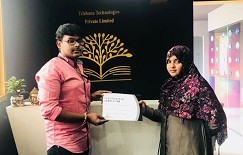
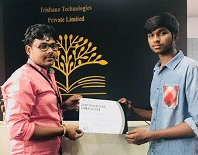
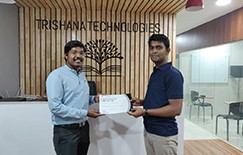
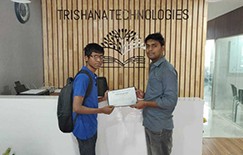
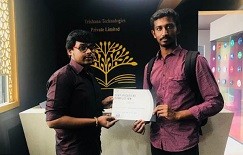

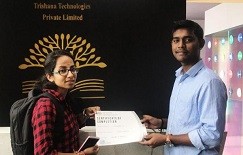
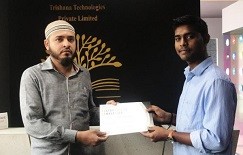
Basic Interview Questions
- Inheritance
- Abstraction
- Polymorphism
2. How can we implement Object Oriented Programming concepts in java?
Using the techniques of Classes and Objects
3. What is meant by Class in Java?
Class is a group of variables and methods.
4. What is meant by Object in Java?
Object is an instantiation of class.
For protecting the object information is called Encapsulation.
The concept of re-using the existing object functionality in new object creation is called as inheritance.
The concept of hiding implementations and shows functionality of Object in communication is known as abstraction.
Class that allows Abstract methods (methods without body) and Concrete methods (methods with body) is abstract class
Interface allows us to define only abstract methods.
Defining an Object(class) that shows different behavior while communicating with objectsis known as polymorphism.
Feedback
What Students Say

Java Full Stack Developer Course FAQs
You can turned out to be a Full Stack Java Developer by the knowledge of Core Java SE-9, RDBMS, HTML, CSS, JavaScript, MongoDB, Angular JS, JSP, Servlet, Spring Boot, and Web Services etc.
High-level Programming Knowledge like C, CPP. Moreover, if you have HTML, CSS, and JavaScript it will be helpful.
Yes, it is. Full Stack Java Course Certification, as well as Java training, come to a collection of vested market value and notice among employers. Java is an object-oriented programming language that was intended for use in embedded systems, with a focus on enable programmers to write down small, fast applications. It has ever while turned out to be popular for large-scale enterprise applications and is currently one of the most in wide-ranging used programming languages in the world.
While a postgraduate may not be a essential for becoming a full-stack developer, it is usually something that companies hiring are looking for that.
In addition to a bachelor’s degree in related fields, a full stack developer must have an knowledge of technologies such as HTML, CSS, JavaScript, AJAX, and PHP. You must also have understanding of deploying and maintain web applications.
At starting itself, full stack developer can earn around US$75k and INR 6 lakhs yearly.
It is essential to know the basics of the technology you use. To study the ins and outs of all the technologies you are accepted with. To give the details of your courses, further programs that you may have in use, and in order on your past jobs and what you have skillful from them.
Syllabus of Full Stack Developer Course
• HTML Fundamentals
• Basic Tags
• New Tags in HTML5
• Local Storage
• Index DB
• CSS3 Fundamentals
• CSS3 New Properties
• CSS3 Animation
• CSS3 Tooltips
• CSS @Media Query and CSS Pagination
• JQuery Introduction
• JQery Effects
• JQuery Form and JQuery Events
• AJAX and JSON AJAX
• Introduction to Object Oriented concepts
• Functions
• Closures
• Creating objects using constructor and Prototype
• Introduction
• Binding and Expression
• Directives
• Controllers
• Filters
• Form Features
• Modules
• Services
• Routing and SPA
• Angular JS
• MVC(Model View Controller) Web API
A First Look
Java Basics
Class and Object Basics
Flow of Control – Branching and Iteration
Strings and Arrays
Packages
Composition and Inheritance
Interfaces
Exceptions
JDBC
Java Collections and Generics
The Java Streams Model
Working with Files
Advanced Stream Techniques
Java Serialization
HTTP 1.1 Protocol, request response life cycle
What is a J2EE application, its architecture and what is an Application Server?
Introduction to Servlets, their specifications and diverse types of server-side frameworks
JDBC and connecting a java application with database
ORM Frameworks available and basics of Hibernate
Introduction to Oracle Database
Retrieve Data using the SQL SELECT Statement
Restrict and Sort Data
Usage of Single-Row Functions to Customize Output
Invoke Conversion Functions and Conditional Expressions
Aggregate Data Using the Group Functions
Display Data from Multiple Tables Using Joins
Use Sub-queries to Solve Queries
The SET Operators
Data Manipulation Statements
Use of DDL Statements to Create and Manage Tables
Schema Objects
Management of Schema Objects
Data Time Operations
Retrieve Data Using Sub-queries
Build in Function (Regular Expressions)
• Introduction to Spring Boot
• Setup of Spring Boot project
• Adding Web Capability
• Create resource using Spring Boot
• RestfulWebServices using SpringBoot
• Creating a Hello World Example
• Creating User Bean and User Services
• Implementing GET methods for User Resource
• Implementing POST methods for User Resource
• Implementing Handling Exception
• User Post Resource and Exception Handling
• Implementing Hateos
• Internationalization of RESTful Services
• Configuring Auto Generation of Swagger Documentation
• Monitoring APIs using Spring Boot Actuator
• Implementing Basic Authentication with Spring security
• Connecting services using JPA
Book Your Free Demo Now

